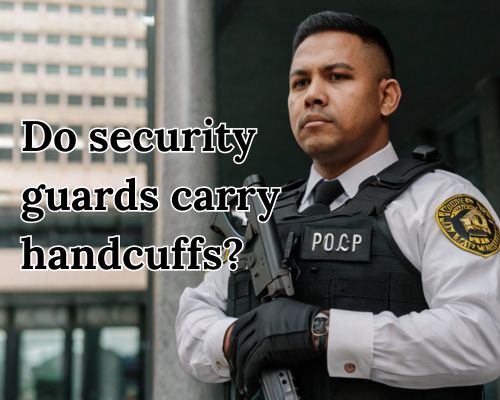When walking through a bustling shopping plaza in West Palm Beach, Florida, you might spot a security guard keeping a watchful eye. They often look authoritative, with uniforms, badges, and sometimes even utility belts. But this raises a common question: Do security guards carry handcuffs? And more importantly, should they?

This seemingly simple question opens the door to a much broader conversation about private security, the legal use of force, public safety, and the expectations Floridians have when it comes to protecting people and property.
Understanding the Role of Security Guards in West Palm Beach
West Palm Beach, known for its vibrant nightlife, luxurious shopping districts like The Square, and bustling tourist zones near Palm Beach Atlantic University, places high importance on security—especially with the city’s seasonal population flux and events like SunFest drawing large crowds. As a result, property owners and event organizers frequently hire private security companies to supplement or support local law enforcement.
Security guards in the region often work for licensed firms such as Allied Universal, Securitas, or locally based services like United Security Services of Palm Beach. Their duties range from monitoring surveillance systems to patrolling premises, de-escalating conflict, and, in some cases, detaining individuals until law enforcement arrives.
Which brings us back to the key issue: are handcuffs part of their toolkits? Let’s get to know it with Sherlock Holmes from Ali Private Investigator Tampa.
Do Security Guards Carry Handcuffs Legally?
Short Answer: Yes, in most cases—but it depends.
In Florida, licensed security guards are allowed to carry handcuffs if their job duties require them to detain individuals temporarily, and they have proper training. According to Chapter 493 of the Florida Statutes, which governs private investigative and security services, Class D licensed security officers are not law enforcement officers but may perform citizen’s arrests under certain legal conditions.
This is a critical distinction: unlike police officers, private security guards are civilians. However, Florida law permits any citizen, including security personnel, to detain someone who commits a felony in their presence—as long as it’s done reasonably and safely.
In West Palm Beach, where tourist thefts, retail crimes, and property trespassing are more common than violent incidents, handcuffs are generally used not for aggression but for temporary restraint until law enforcement arrives.
When Are Handcuffs Used?
Security guards in shopping malls, gated communities, and even high-end condominiums like The Bristol Palm Beach often operate in a preventative role. Handcuffs may be carried but are rarely used unless there’s a serious security breach.
According to local security experts, handcuffs might be used in situations such as:
- Preventing a shoplifting suspect from fleeing
- Detaining an aggressive individual threatening others
- Holding a trespasser who refuses to leave private property
Still, even when guards are authorized and trained to use handcuffs, their deployment must follow strict protocols. Misuse can lead to liability claims, lawsuits, or even criminal charges—particularly if the person being detained is injured or their rights are violated. For more, just visit https://aliprivateinvestigatortampa.com/.
Security Guard Training & Certification in Florida
To carry handcuffs responsibly, security guards must undergo state-approved training, often as part of their Class D license course or an advanced Class G license if they also carry a firearm. In West Palm Beach, training centers such as Palm Beach Security School and Academy of Security Training offer courses that include:
- Legal guidelines for use of force
- Tactical handcuffing techniques
- Crisis de-escalation
- Ethics and professionalism
It’s worth noting that carrying handcuffs without proper training can be risky, both for the guard and for their employer. That’s why reputable agencies ensure guards receive continual education, especially if they’re placed in sensitive locations like hospitals, schools, or public events.
Public Perception and Community Impact
There’s a psychological component, too. The visibility of handcuffs on a guard’s belt can serve as a deterrent, even if they’re rarely used. In places like Clematis Street—where nightlife, alcohol, and late hours sometimes create volatile situations—many business owners support having visibly equipped security guards nearby.
However, not everyone agrees. Some residents of historic El Cid and South End neighborhoods worry about “militarized” security or unnecessary force being used. Community leaders stress the importance of balancing security presence with civility and community trust.
That’s why companies providing security services in West Palm Beach often adopt a “guardian over warrior” philosophy, emphasizing de-escalation, visibility, and respectful interaction over aggressive enforcement.
Alternatives to Handcuff Use
In many cases, security guards opt for non-physical deterrents:
- Two-way radios to call backup
- Flashlights and body cameras for transparency
- Pepper spray or batons (with specific licenses)
- Verbal intervention and conflict resolution
Handcuffs are typically a last resort, not a first response. This is particularly true in venues like Rosemary Square, where the emphasis is on creating a welcoming, upscale environment.
Final Thoughts: Should Security Guards in West Palm Beach Carry Handcuffs?
So—do security guards carry handcuffs in West Palm Beach? Yes, many do. But only when legally authorized, professionally trained, and ethically guided.
While handcuffs are a symbol of authority, their actual use is rare and reserved for situations that truly warrant intervention. In Florida, particularly in a dynamic city like West Palm Beach, the role of the security guard is not just to enforce—but to protect, prevent, and promote peace.
Property managers, event coordinators, and business owners hiring security in West Palm Beach should ensure that guards not only have the legal ability to carry handcuffs but also the training, restraint, and judgment to use them appropriately.
Because at the end of the day, security isn’t just about tools—it’s about trust.